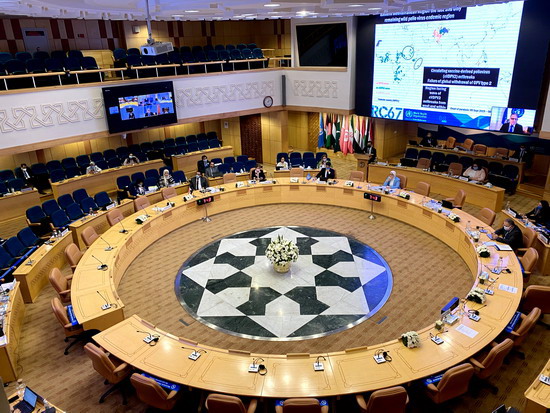 Delegates listen to Regional Polio Director Dr Hamid Jafari’s presentation on polio eradication in the Eastern Mediterranean Region. Credit: WHO/EMRO
Delegates listen to Regional Polio Director Dr Hamid Jafari’s presentation on polio eradication in the Eastern Mediterranean Region. Credit: WHO/EMRO
Renewed political commitment drives likely formation of new subcommittee for polio eradication and outbreaks.
14 October 2020 – Yesterday the 67th Regional Committee for the Eastern Mediterranean discussed a resolution on polio, which includes the creation of a new ministerial regional subcommittee to focus on the most critical barriers standing in the way of polio eradication.
Following the certification of the African Region as free of wild poliovirus, the Eastern Mediterranean Region is the only region in the world still harbouring wild poliovirus. After a bruising 2019 where we saw wild poliovirus on the rebound in Afghanistan and Pakistan, 2020 dawned with high hopes that the programme would be able to shift gear and make up for lost ground. The COVID-19 pandemic put the brakes on those plans and added untold layers of complexity to the provision of health care, but it hasn’t destroyed the dream. The new subcommittee, if adopted, will be a strong demonstration of Member States’ political commitment and solidarity towards getting polio eradication back on track.
The risk of international spread of poliovirus remains a public health emergency of international concern. During 2020, the Region has experienced new outbreaks of vaccine-derived poliovirus in Sudan and Yemen, even as the outbreaks in Somalia, Afghanistan and Pakistan continue to paralyse children. The new subcommittee would aim to intensify support to these countries. An immediate priority is advocating for the domestic and international financial resources needed to close outbreaks and eradicate the disease once and for all.
In the next few months, the polio programme plans to roll out a new type 2 oral polio vaccine, specifically designed to tackle vaccine-derived outbreaks. This is likely to have a transformative effect on our abilities to protect children and stop outbreaks spreading further. But the introduction of a new vaccine does not negate the importance of other tactics to fight vaccine-derived polio, including high quality disease surveillance, building community vaccine acceptance and strengthening routine childhood immunization.
The messages the subcommittee would likely convey in its reports to WHO's governing bodies apply to all polioviruses: that routine and supplementary immunization systems must improve across the Region, and every child must receive the vaccines they need. The subcommittee would also work to promote political and social neutrality and facilitate access to all children living in conflict-affected areas.
The subcommittee would be made up of health ministers from interested Member States of the Region, with special invitations extended to representatives from Afghanistan and Pakistan. The group would meet four times a year.
During the Regional Committee meeting, the Governments of Egypt, Islamic Republic of Iran and Pakistan expressed a desire to lead the charge by joining the subcommittee. If the resolution is adopted, WHO will be inviting all ministers of health to express their interest in becoming members.
The Pakistan representative stated, “The Government of Pakistan welcomes and supports the establishment of a subcommittee of polio eradication. Dr Faisal Sultan, the Special Assistant to the Prime Minister on Health, has expressed his willingness to take part in the subcommittee, which will undoubtably provide an ideal platform to strengthen regional cooperation and support Afghanistan and Pakistan in successfully eradicating poliovirus across the shared epidemiological block.”
Dr Hamid Jafari, WHO Regional Director for Polio Eradication, thanked Member States for offering their support for the creation of the subcommittee, and the entire resolution, saying, “This is a crucial step forward to regain ground lost against the poliovirus in the last two years. Strong political commitment to the polio eradication goal is paramount for us to defeat this disease”.
In the run up to World Polio Day on 24 October, the adoption of the resolution would be a meaningful step forward towards achieving a polio-free future for all children in the Eastern Mediterranean Region. The WHO continues to emphasize the importance of high-quality immunization for every child, and advocates for access to every community in order to reach all children with vital health services.


